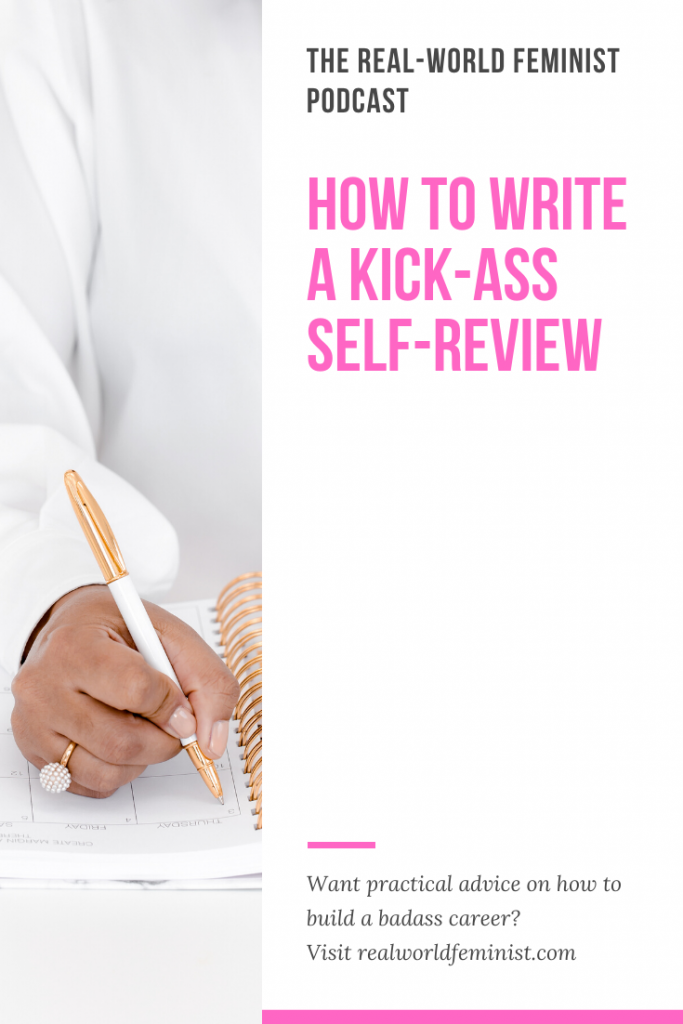
Episode #23: How to Write a Kick-Ass Self-Review
As the year winds down, the next couple of weeks tend to be quiet in corporate America. People are out of office, deadlines are relaxed, and in many ways, it feels like a wasted week.
Whether you are in the office or off for some well-deserved rest and relaxation, don’t waste this moment. You can and should use this time to your career advantage.
Take this gift of peace and quiet to write a kick-ass self-review!
Even if a self-assessment isn’t part of your company’s annual review process, you should prepare one anyway.
Self-reviews are effective in a number of ways.
They help you reflect on your accomplishments and take a moment to acknowledge them. Self-reflection is healthy and necessary for your professional and personal growth. You can’t effectively plan on what’s next without understanding and acknowledging where you currently are.
Self-reviews also provide an important opportunity to gain a written record of your professional badassery. Why not make it super easy for your boss to remember how awesome of a year you’ve had?
Here’s how you write a kick-ass self-review.
Treat your first draft as a self-journaling exercise.
Use this first pass at writing your self-review to capture all of your unedited thoughts. I suggest writing this draft by hand. Once you start typing, you’ll start editing.
Remember, this draft is for your eyes only. Let it flow! Your boss or HR contact will never see this first, unedited version.
Capture all of your accomplishments, big and small.
You are free-forming content at this point. Don’t just use the lens of your documented goals to examine your accomplishments.
Sure, there are big accomplishments that are easy to recall. Go deeper than that.
Capture all of your thoughts to the following thought-starter questions:
- What accomplishments made you truly proud?
- What did you learn in the past year?
- How did you contribute to your team’s success?
- How did you help others build their careers or achieve success?
- What new responsibilities did you take on this year?
- What kudos did you receive throughout the year from internal and external contacts?
Glance through the past year’s calendar and email archive to jog your memory.
Don’t eliminate anything at this point.
Take an honest look at what could have gone better.
Self-assessment has to include a hard look at situations that challenged you, too. How can you grow if you are only looking at what went perfectly?
Journal your thoughts to the following questions:
- Where did you fall short?
- If you had a do-over, what would you do differently?
- What did you find challenging to accomplish?
- How could you have better asked for help or support?
- Is there a way your manager could have better supported your success?
- What skills do you need to learn or improve upon?
Remember, no one will you will see this draft so be honest with yourself.
Give yourself at least 24 hours to marinate on your thoughts.
Once you have journaled your thoughts on all things that went well or could have gone better, my suggestion is to allow a little time before you start the editing process. Give yourself a little space to breathe before you start the editing process.
Trust me on this, your brain needs a break. You can’t just flip a switch from brainstorming to editing mode. Take at least a day before editing your draft.
Highlight the items from your journaling that you know need to make it into your official written self-review.
Once you’ve allowed a little time to let your thoughts steep, it will be easier to recognize the key items you’d like to cover in your official written documentation.
Edit your thoughts into the format provided by your employer.
Most companies will have a format for providing self-assessments.
If not, I suggest using the following simple format:
- Accomplishments: a summary of goals accomplished; new skills attained; new responsibilities successfully gained.
- Challenges: a summary of what you were challenged by; what could have gone better; what lessons you learned
- Themes for the upcoming year: your wish list for stretch assignments & goals; training opportunities; how the company can better support your growth
Take all of this awesome work you’ve done reflecting on your past year and edit them down to the core.
Be a notorious editor and consider getting another set of eyes on your work. When you are presenting to company leaders, you need to boil down your thoughts to the core essence. Make sure your points aren’t lost in pages of bullet-pointed detail.
GET TO THE POINT.
Deliver your edited self-assessment to your manager at least a week before your review meeting.
Ensure your boss has enough time to digest and react to your self-assessment. Sending this document one-day before your review is a waste of time. Ideally, your manager will have your self-assessment in hand when they sit to prepare for your official review discussion.
If your company has an official tool to submit your self-review, use it. That’s the official record! If not, send a copy via email, to ensure that there is a documented written record.
You can’t expect others to recognize your accomplishments and invest in your career if you won’t.
Take the time to document and submit a well-crafted self-assessment.
Subscribe & Review in iTunes
Hey, sis. Have you subscribed in iTunes yet? I’m cooking up all of this stuff to help you succeed in your career and life—I don’t want you to miss any little bit! Click here to subscribe in iTunes.
If you have found my content to be helpful, I would be so grateful if you would leave a 5-star review on iTunes. Reviews help the podcast get found by other Real-World Feminists! Please help me spread the word.